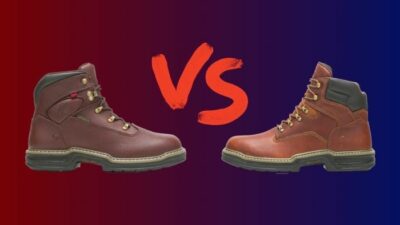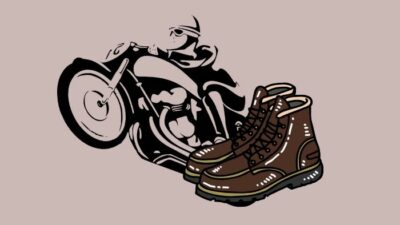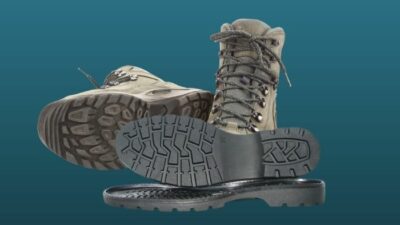Don’t you think safety in the workplace should be the topmost priority for everyone? Because You never know when you land yourself in danger.
While there are many forms of PPE, the question does arise whether or not workboots fall under this category. Don’t you worry! After infinite hours of intense research, I’ve compiled this informative article to answer all your questions.
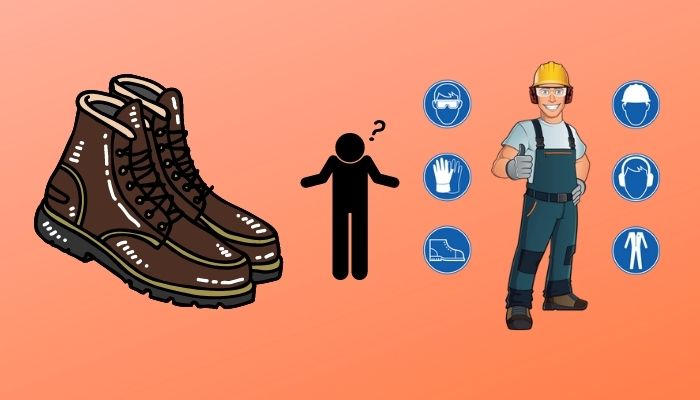
Without wasting time, let’s get to the point first; Are work boots considered PPE?
So, work boots are considered PPE, but there’s more to it. Keep on reading to know it all.
What is PPE?
While some were familiar with this term long ago; but, thank’s to the Corona Virus pandemic almost all of us are familiar with this acronym. So, what does it actually stand for?
It is used in a variety of working industries. Medical staffs and construction workers know better.
PPEs are not any kind of specified gadgets, and they vary according to the job.
Workers in chemical factories, construction sites, and hospitals have different forms of Personal Protective Equipments.
Also, follow our guide on How Long Do Work Boots Last.
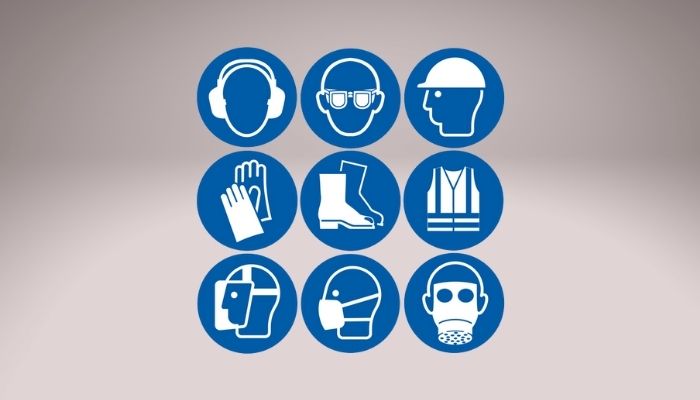
Some common forms of PPEs are:
- Safety glove
- Googles
- Safety helmets
- Masks
- Aprons
- Safety boots
While you can share specific PPEs, others are strictly meant to be used by one individual only.
Check out our separate post: What Work Boots Are Made In The USA.
Are Work Boots Considered PPE? Answered
By now, I think you’ve got your answer. Yes, work boots do qualify as PPE. Workplaces, in general, are full of danger, even though various preventive measurements are taken to ensure maximum protection.
PPEs act as the last line of protection in case all the other safety measures are breached.
In the health care industry, PPE is a common facility given to the workers to protect them from contagious molecules, bacteria, or viral contamination. Working without them is highly discouraged.
Common PPE in the health care sector include:
- Face shields
- Goggles
- Safety gloves
- Safety masks
- Aprons
- Respirators
Personal Protective Equipment is also prominent in construction sites, especially if you take into the risks involved.
Does the shining yellow helmet ring a bell? That’s right! It’s been a form of PPE in construction workers all along. It’s not the only gadget you require though! Workers must have protection from electrical, physical, and mechanical hazards. So, what other gears do they need?
Also, check out our guide to know Are Work Boots Good For Hiking.
PPE in construction sites include:
- Safety helmets
- Coveralls
- Vests
- Safety gloves
- Safety goggles
- Safety boots (ofcourse!)
- Earmuffs
Keep in mind, manufacturers in the USA need to have FDA approval for their products to qualify as PPE.
Follow our epic guide on How Much Do Work Boots Weigh.
Which Work Boots are considered as PPE?
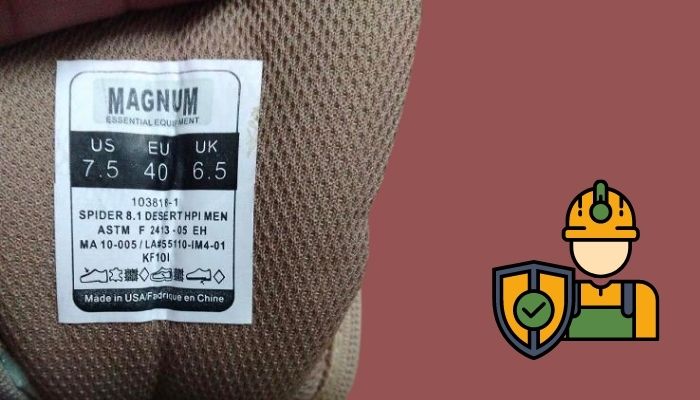
I’m sure you’ve seen the term ASTM 2413-05 while buying your footwear; especially in boots. It stands for American Society for Testing and Materials, which is a developer of international voluntary consensus standards.
In short, it determines whether your boots are safe for working environments.
While ASTM is the organisation, code 2413-05 is for protection against various hazards in the work environment.
According to ASTM 2413-05, a pair of boots is considered a safe working boot if the following criteria are met:
- Impact resistance in the toe area
- Compression resistance in the toe area
- Conductive properties
- Metatarsal protection
- Protection from electric shock
- Static dissipative (SD) properties
- Resistance from punctures in the footwear bottom
- Resistance from chain saw cuts
- Dielectric insulation
If a pair of boots are ASTM 2413-05 certified then it’s safe to say they qualify as safety work boots.
But wait, that’s not all!
OHSA has come to the fray and has collaborated with ASTM to come up with a set of safety features for any workboot to be classified as PPE.
But before that, check out to know Are Doc Martens Considered Work Boots.
ASTM and OHSA safety requirements are:
- Special safety toe
- Leather upper
- Anti-slip soles
- Oil resistance
- Impact resistance rating of 75
- Compression resistance rating of 75
If your work boots meet the above-mentioned criteria, then it’s safe to say; they qualify as PPE
PS: ASTM-2413 has replaced the ANSI Z41 specifications for safety work boots.
Are Employers Obliged to Pay for PPEs?
Certain employers stockpile PPEs and hand them to the workers when needed. I think it’s a good idea since you’ll get them at the exact time of need.
It’s a smart approach, as long as the gears are not wasted.
On the other hand, certain employers turn to reimbursement or a sort of allowance system to ensure their employees receive their personal protective equipment.
For me, the system should not matter as long as the workers receive their PPEs at the right time.
What’s Considered Not to be a Safety Boot (PPE)?
Despite having certain protective features, not all work boots are considered to be PPE. What good are they (safety features) if they can’t protect you from dangers in your workplace?
Different manufacturers will claim their boots to be safety boots, but are they really? A pair of workboots are not PPE if they don’t meet certain criteria. Take, for example, ASTM 2413-05.
Always do your research and go for certified workboots. What good is a couple of bucks, if you aren’t protected the way you should be?
For your convenience, I’ve made a list of footwear that does not qualify as PPE.
Here are the footwears that are not PPE:
- Boots that lack the safety of workers
- Dress shoes
- Sports shoes
- Cowboy boots (not all of them)
- Fancy footwear
- Boots that lack steel/composite toe
- Boots that don’t provide adequate traction
- Boots that aren’t heatproof
- Boots that aren’t shockproof
These are some of the footwear that doesn’t qualify as workboot/PPE. When you go shopping be very careful and check the criteria they have passed. Because it matters!
Which Job Requires Work Boots?
If you think about it in a simple way, people who work on heavy-duty jobs (where there’s more stress on the body and legs) need well-crafted work boots as part of their PPE.
Construction workers, Security officials are the regular customers. But, what about others? As always I’ve listed down the workers who need to wear work boots as part of their dress code/safety.
Here are the people who need work boots:
- Construction workers
- Delivery men
- Security officers
- Electricians
- Plumbers
- Lumberjacks
- Machine assembly workers
- Landscape architect
While there’re more, these guys need work boots the most for their safety.
Final Thoughts
Work boots can be considered as PPE, as long as they meet certain conditions. To determine those criteria, there are organizations. These bodies provide the verification needed for a pair of work boots to be considered PPE.
When we hear this acronym, we tend to relate it with the healthcare industry (special thanks to the coronavirus pandemic). But, this is not the case.
PPEs have been around for ages, people working in various industries can relate.
Nonetheless,I (sincerely) hope you have your answer. Don’t hesitate to notify me; in case I missed anything important. Just drop your advice/queries down in the comment section below as I’m always there for your assistance.
That’s it for today, work hard, stay safe, and most importantly work safely.

